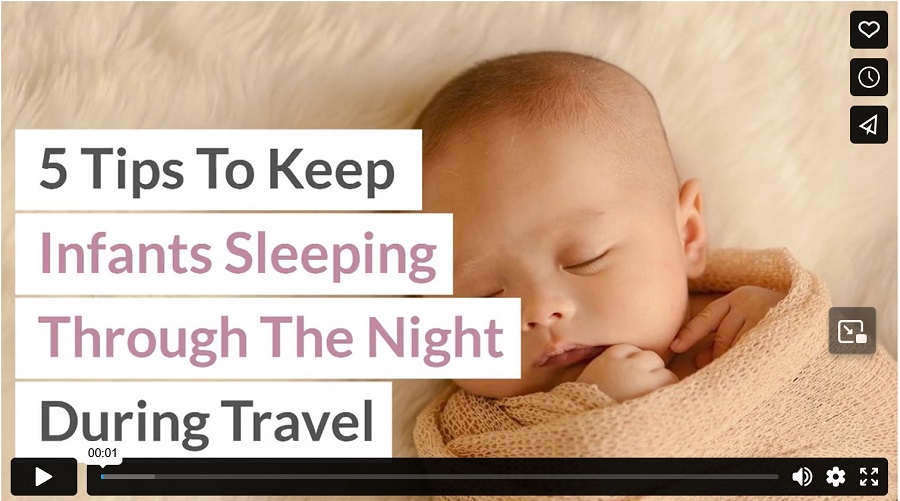Traveling with a baby can quickly make your vacation feel less like a holiday and more like work because nothing can ruin a trip faster than an overtired, fussy baby. Throw in a couple of groggy, sleep-deprived parents, and you’re guaranteed to have some arguments and diminished enjoyment.
Depending on whether your little one has formed a sleeping habit already, traveling will affect their sleep pattern. Here’s how to set yourself and your baby up for success without compromising your sleep or sleep training:
1. Strategically Plan Your Travel Time
Your travel will be much smoother if you aim to travel during their naps. If you are driving, set out with a well-fed, freshly changed infant 15 to 20 minutes before their longest nap of the day. Ensure you can see them at all times so they never slump into the chin-to-chest position or obstruct their nose or mouth. Plan to stop at least every two hours for 20 to 30 minutes to let them get out and stretch their legs. Change their diapers and feed them outside their car seat.
If you are flying, babywearing is an excellent spot for them to nap during the flight. Be aware that you must have them out of the carrier for take-off and landing per FAA regulations. Additionally, their little ears are much more sensitive to cabin pressure changes. Plan to feed your baby during take-off and 30 to 45 minutes before landing to help with their ear pain. They will detect the pressure change before you do and will let you know loudly. Have pacifiers, bottles, straw cups, and pouches to prevent ear popping. Because of all this, aim for a departure time 30 minutes before their longest nap, or if you have multiple flights, time your departures for 30 minutes before each nap time.
2. Start with a Full Tank
Just like you wouldn’t start a road trip with a car on empty, you should do your best to have your little one’s sleep tank filled up. Prepping for your travels can be frantic and rushed, tying up loose ends, packing, and finding last-minute baby travel supplies. Babies can sense this stress, and it can affect their sleep. Make a list in advance to get things done before it gets too hectic. Protect their rest by sticking to their routine and having them nap in their preferred environment leading up until your travel day. If you start with a sleep deficit, it’s tough to recover while traveling.
3. Think About Your Sleep Space in Advance
If you are staying in a hotel, think about the additional space needed for a travel crib and for everyone to sleep comfortably. Most hotels have cribs for you during your stay, but they don’t always provide baby-safe sheets. Bring along a spare crib sheet if you have the space. If staying with family or friends, ask about space for your baby to sleep. Try to keep your sleep arrangements similar to your home environment. Pack the essentials to make their room similar: pacifiers or comforters like their favorite cuddly toy, a sound machine, their swaddle or sleepsack, and their bedtime routine essentials such as bath bubbles and lotion.
4. Keep Your Bedtime Routine
If you have already done sleep training with your baby, you will likely have an established nighttime routine. If you want more time for fun, you might try to skip the routine on vacation. However, the routine helps cue your infant’s brain that it’s time to wind down for sleep. If you do a bath before bed at home, followed by a bottle and story time, continue to do that on vacation. A predictable rhythm helps babies stay calm even when their surroundings look slightly different.
5. Aim For a Solid Nap Per Day
If you are the type to cram every possible activity into your itinerary, you need to remind yourself that vacationing with an infant is different. Can you still do the things you enjoy? Absolutely, but you will need to carve out some nap time to keep your baby happy and allow you to stay on schedule with everything else. Plan their longest nap in the optimum sleep environment, such as their crib or being pushed in the stroller for a long walk. Having that one restful nap will ensure you don’t end up with a cranky, overtired baby.
Special Tips for Dealing with a Time Zone Change
Unless you are traveling halfway around the world or staying for an extended time, it’s easiest to keep your little one on their home time zone. Shifting time zones can be difficult, making sleep tricky on vacation and when you return as well. This is easier to do when traveling east as your baby’s wake-up and bedtime will shift later than normal.
When traveling west, you are in for some early mornings. Ensure their room is dark to help avoid this. If it’s just not feasible to maintain their normal bedtime, as that can move to late afternoon, add a catnap to stretch them out until a more reasonable bedtime for you.
If you are trying to get your infant to adjust to the new time, you can shift their sleep time by 15 minutes each night until you have them on the desired time zone before you travel. Once traveling, use the light to your advantage. When you want them to wake up in the morning, ensure you expose them to plenty of natural light. This will help reset their circadian rhythms and adjust to the local time.
Travel can be hard on everyone in the family. Remember, flexibility is vital. Your baby may not even notice the change, or they could be extra needy, requiring extra attention. They can be unpredictable, so maintaining flexibility will maximize your enjoyment on vacation.
Follow these tips to help your infant sleep, and no matter what, don’t fall back on old habits to get your baby to sleep. Stick with what you’re doing now that works at home. This will make your transition back home much smoother, keeping your good habits intact, even if it doesn’t feel like it on your trip.
Infographic
Traveling may alter your child’s sleep routine, depending on whether they have developed a sleeping habit already. The following tips can help you and your baby succeed without sacrificing your sleep or sleep training. Everyone in the family may find traveling difficult. Recall that adaptability is essential. Don’t rely on previous routines to put your baby to sleep; instead, pay attention to these suggestions.

Video



